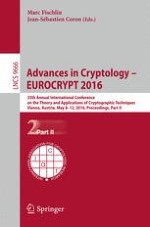2016 | OriginalPaper | Buchkapitel
Fair and Robust Multi-party Computation Using a Global Transaction Ledger
verfasst von : Aggelos Kiayias, Hong-Sheng Zhou, Vassilis Zikas
Erschienen in: Advances in Cryptology – EUROCRYPT 2016
Verlag: Springer Berlin Heidelberg
Aktivieren Sie unsere intelligente Suche, um passende Fachinhalte oder Patente zu finden.
Wählen Sie Textabschnitte aus um mit Künstlicher Intelligenz passenden Patente zu finden. powered by
Markieren Sie Textabschnitte, um KI-gestützt weitere passende Inhalte zu finden. powered by
